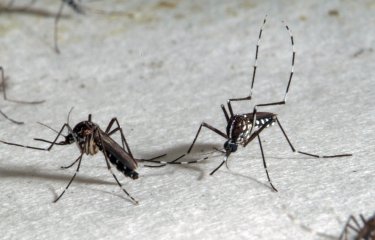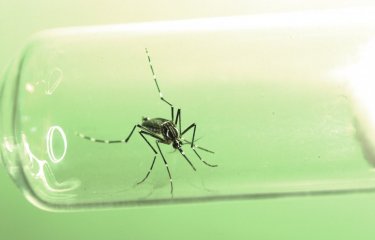Scientists from the Institut Pasteur have demonstrated that the tiger mosquito, already a vector of diseases such as dengue and chikungunya, has become capable of transmitting the West Nile and Usutu viruses. This emergence may be surprising, but steps can already be taken to tackle it.
The tiger mosquito, Aedes albopictus, is known to serve as the vector for several viruses that are pathogenic for humans. In mainland France, it was responsible for the first transmission of dengue, chikungunya and Zika. But there is little available information about the transmission of two other viruses, the West Nile and Usutu viruses. These viruses, which are transmitted by the mosquito Culex pipiens and particularly infect humans and birds, are on the rise in France: West Nile virus was first reported in Camargue back in the 1960s, while Usutu virus was reported in eastern France in 2015.
As part of a surveillance program for mosquitoes in the Grand Est region, scientists from the Institut Pasteur, the University of Reims Champagne-Ardenne and the Strasbourg Institute of Parasitology and Tropical Diseases set out to measure the ability of five mosquito species to transmit the West Nile and Usutu viruses. "A lot of our results were predictable, except when it came to the Aedes albopictus (tiger) mosquito, which was revealed to be capable of transmitting both viruses," reports Anna-Bella Failloux, Head of the Institut Pasteur's Arboviruses and Insect Vectors Unit and coordinator of the study.
Migratory birds as intermediaries
In spring, millions of birds embark on a lengthy migration to their breeding sites. France's Grand Est region is a common stopover site for birds that can carry the West Nile and Usutu viruses. By biting humans and birds for a blood meal, the tiger mosquito may potentially serve as an intermediate vector, transmitting the viruses from birds to humans. But the scientist downplays the risk: "With our knowledge of the territorial distribution of the tiger mosquito, we can already map the areas where the two viruses may be transmitted to humans. We can step up our surveillance of mosquitoes and birds near urban areas, where the tiger mosquito is already found."
This study is part of the priority scientific area Emerging infectious diseases of the Institut Pasteur's strategic plan for 2019-2023.
Source
Assessing vector competence of mosquitoes from northeastern France to West Nile virus and Usutu virus, PLoS Neglected Tropical Diseases, June 5, 2023
Jean-Philippe Martinet, Chloé Bohers, Marie Vazeille, Hubert Ferté, Laurence Mousson, Bruno Mathieu, Jérôme Depaquit, Anna-Bella Failloux





